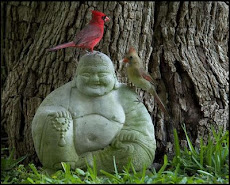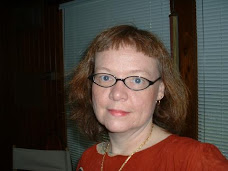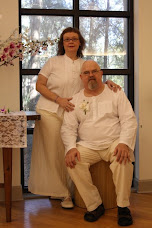Our silver Toyota crosses over the Escambia Bay on Interstate 10, in northwest Florida. It is a bright June afternoon in 2005. Soon we will arrive in Pensacola, where we will check into our beachfront hotel, change our clothes, and then drive to the chapel where my father's funeral will be held.
A former college president, my dad spent the later years of his career as an educational advisor to the U.S. Navy's flight school program and taught as an adjunct at a local university. After I graduated from college, I had little contact with my dad. He was a quirky, introverted type, and in the years following his retirement, he lived almost reclusively with his wife in the pine woods of the Florida panhandle. He seemed to have little interest in me. I was seldom invited to his house for the holidays, and some years I did not even receive a birthday card from him.
At the chapel, a small crowd of friends and relatives has gathers the service. The minister asks to meet with the family in the study behind the chapel. In the study, my dad's wife drops a small velvet pouch into my hand and tells me that he wanted me to have it. I open the pouch, and my dad's chunky diamond ring that he wore for many years twinkles up at me. I am very surprised. I am at a loss for words, and the only response I can think of is a simple "thank you."
Later back at the hotel, Jack suggests going out on the beach after dinner. We pick up a bottle of chardonnay and stroll down to the beach. We sip our wine and enjoy the sunset. The Gulf of Mexico's waves roll gently against the shore, like meditative breathing, with long slow rhythmic inhalations and exhalations. The chardonnay we are sharing is the most delicious wine I have ever tasted. Jack and I sit close together in the sand, our arms around each other, snuggling. I feel warm, safe, and loved. We stay on the beach until after dark and we can no longer see the ocean. We listen to the sounds of the surf. I am so happy to have Jack here with me. Our relationship is worth more to me than a sea of diamonds.
Psychiatrist Karl Menninger wrote that our lives are shaped by those who love us as well as those who refuse to love us. I believe that my dad, like most folks, did the best he could. As I look back, I realize that there are some things I could have done differently as his child, but I, too, was doing the best I knew how at the time.
The Buddha said that the past is already gone, and the future is not yet here. There is only one moment for us to live, and that is the present moment. Vietnamese Zen master Thich Nhat Hahn teaches us to say "I have arrived, I am home" in our meditation. I love this mantra. This helps me to live in the present moment, right here and now. My home is in my heart. I no longer feel all the anger and resentment that I did in my youth about the home from which I came. I just finished reading Elizabeth Gilbert's book "Eat, Pray, Love". She says our life's work is to take the circumstances in which we find ourselves and create something beautiful and meaningful out of them. I think that's fabulous advice. I will turn 50 this year. I think her advice is a pretty good goal for the second half of my life.
Wednesday, March 26, 2008
Sunday, March 23, 2008
Career Behind Bars
The year is 1989. I am driving south on Highway 441 in Marion County, Florida, in my baby blue 1969 VW Beetle. The radio no longer works in my little old bug, so I carry a portable cassette player with me on the road. Carly Simon's album "Coming Around Again" is keeping me company during my drive today. The sun is peeking over the horizon and the sky is becoming light. Stately horse farms line both sides of the road. This year's foals are kicking up their heels in the lush pastures. A new colt teeters uncertainly on spindly legs next to his mother. The thoroughbred mare apparently just gave birth to him last night. The scene reminds me so much of Kentucky, where my family is from. The bucolic landscape give me peaceful feeling. The colt's mother nudges him with her muzzle, and he lowers his little head under her belly and begins to nurse as I roll on past the farm.
I pull into the parking lot at the state women's prison. This isn't what I thought my career would be like. I wanted to be a mental health professional and a nurse practitioner. I never dreamed that I would be practicing in this type of environment. In graduate school, I discovered, to my dismay, that if you want work with the mentally ill in Florida, a large segment of this population is in jail or prison. This is the result of a movement called deinstitutionalization, in which thousands of psychiatric patients were released from state mental hospitals over the years and mainstreamed into community mental health programs. Because the community mental health centers are generally underfunded and not equipped to provide adequate services for Florida's mentally ill, many of these patients are at increased risk for getting in trouble with the law. Detention centers and correctional institutions have become the de facto psychiatric treatment facilities.
My entry level position in the prison system is counseling in a substance abuse treatment program. Many of the women in my program have only a middle school education, were physically or sexually abused as children, and have been using drugs and alcohol since their pre-teen years. Some have limited reading skills and have never been gainfully employed. My patients tend to be underdeveloped as people, because of the aversive circumstances under which they were raised (poverty, abuse, neglect, etc.). Some of the women have never played softball, planted flowers, written a poem, or baked cookies. Even though prison is an oppressive environment, it provides a structured setting where the women can learn life skills and and try to build an existence that doesn't revolve around cocaine, heroin, or booze. Some female inmates have practiced prostitution in exchange for drugs, or just to keep a roof over their heads. Others have lost custody of their children because of criminal records and substance abuse problems. A few have made suicide attempts by cutting in the past, and bear scars on their wrists to show for it. Several of the women have never belonged to a church and have no religious or spiritual affiliation. Some have borderline intellectual functioning or mild mental retardation. Most have suffered from depressive episodes. Some are youthful offenders, and are as young as age 15.
Fast forward to 2008, and I am heading west on State Road 16 in Raiford, Florida, towards my current practice site, a maximum security men's prison. I'm listening to Jack Kornfields's CD "The Wise Heart, A Guide to the Teachings of Buddhist Psychology" as I commute. I park my 2001 silver Toyota Echo in the employee lot and enter the facility. I insert my right hand into a fingerprint scanner in the sallyport. A correctional officer searches my handbag. A heavy iron gate clangs shut behind me, and I enter the compound where just over 2000 prisoners are housed.
As a mental health professional with 20 years of experience, I am now the psychiatric provider and prescriber for a 60-bed long-term inpatient psychiatric unit for closed management inmates with serious mental disorders. During a departure from the prison system, I was the Director of Mental Health at a county jail for a couple of years, I practiced as a primary care and psychiatric ARNP with the Veterans Administration for a time, and even tried my hand at private practice. In 2007, with the prospect of turning age 50 looming large, I decided to return to the prison system and get a few more years in the state retirement system.
Most of my patients in my current practice suffer from schizophrenia, bipolar disorder, antisocial personality disorder, or borderline personality disorder. Our treatment team includes a clinical psychologist, three mental health counselors, and a psychiatric nurse. Many of the patients in my unit are serving life sentences for sexual battery or murder. Two of my patients have killed other inmates since they have been in prison. A few of my patients are sentenced to death. Several are living with HIV. Some have suffered head injuries resulting in seizure disorders, as well as permanent changes in personality, judgement, impulse control, and cognitive functioning. Others have survived gunshot or stab wounds. The majority were substance abusers prior to incarceration. Many of my older patients are being treated for chronic illnesses such as diabetes mellitus, heart disease, and emphysema, in addition to their mental disorders. One of my patients amputated his penis with a razor blade during a psychotic episode. Others engage in bizarre behavior such as smearing feces when they are severely agitated or not in touch with reality. One of my patients suffers from the fixed delusion that he has a transmitter implanted in his brain and the warden can hear his every thought.
The correctional officer in our building's control room buzzes me in through a series of locked doors. In my office, I brew some Starbucks Breakfast Blend coffee in my Mr. Coffee machine, tune in to NPR on the radio, and boot up my computer to check my email. Next I will move into my daily routine of seeing patients for psychiatric evaluations, mental status examinations, and monthly psychotropic medication check-up visits. I do the best I can to treat my patients' mental disorders and relieve their suffering. Some days I feel as though I accomplish nothing at all. Therapeutic victories here are modest and infrequent.
There is nothing glamorous about my career. Sometimes I have difficulty finding meaning in my my work, and I am ambivalent about continuing. Not only is the clinical work taxing and sometimes unrewarding, the politics of a government position can be thorny and complex. I am grateful for my experience behind bars, because it has given me the opportunity to learn about aspects of human nature to which I would never have been otherwise exposed. Over the years, I have worked with so many patients whose souls are severely damaged and scarred. These patients are victims as well as victimizers, caught in a cruel karmic circle that turns over and over upon itself. For most of them, ending this cycle will have to occur in another lifetime. Their karma probably cannot be repaired in this life.
I pull on my white labcoat, grab my coffee mug and an ink pen, and head into the ward.....
I pull into the parking lot at the state women's prison. This isn't what I thought my career would be like. I wanted to be a mental health professional and a nurse practitioner. I never dreamed that I would be practicing in this type of environment. In graduate school, I discovered, to my dismay, that if you want work with the mentally ill in Florida, a large segment of this population is in jail or prison. This is the result of a movement called deinstitutionalization, in which thousands of psychiatric patients were released from state mental hospitals over the years and mainstreamed into community mental health programs. Because the community mental health centers are generally underfunded and not equipped to provide adequate services for Florida's mentally ill, many of these patients are at increased risk for getting in trouble with the law. Detention centers and correctional institutions have become the de facto psychiatric treatment facilities.
My entry level position in the prison system is counseling in a substance abuse treatment program. Many of the women in my program have only a middle school education, were physically or sexually abused as children, and have been using drugs and alcohol since their pre-teen years. Some have limited reading skills and have never been gainfully employed. My patients tend to be underdeveloped as people, because of the aversive circumstances under which they were raised (poverty, abuse, neglect, etc.). Some of the women have never played softball, planted flowers, written a poem, or baked cookies. Even though prison is an oppressive environment, it provides a structured setting where the women can learn life skills and and try to build an existence that doesn't revolve around cocaine, heroin, or booze. Some female inmates have practiced prostitution in exchange for drugs, or just to keep a roof over their heads. Others have lost custody of their children because of criminal records and substance abuse problems. A few have made suicide attempts by cutting in the past, and bear scars on their wrists to show for it. Several of the women have never belonged to a church and have no religious or spiritual affiliation. Some have borderline intellectual functioning or mild mental retardation. Most have suffered from depressive episodes. Some are youthful offenders, and are as young as age 15.
Fast forward to 2008, and I am heading west on State Road 16 in Raiford, Florida, towards my current practice site, a maximum security men's prison. I'm listening to Jack Kornfields's CD "The Wise Heart, A Guide to the Teachings of Buddhist Psychology" as I commute. I park my 2001 silver Toyota Echo in the employee lot and enter the facility. I insert my right hand into a fingerprint scanner in the sallyport. A correctional officer searches my handbag. A heavy iron gate clangs shut behind me, and I enter the compound where just over 2000 prisoners are housed.
As a mental health professional with 20 years of experience, I am now the psychiatric provider and prescriber for a 60-bed long-term inpatient psychiatric unit for closed management inmates with serious mental disorders. During a departure from the prison system, I was the Director of Mental Health at a county jail for a couple of years, I practiced as a primary care and psychiatric ARNP with the Veterans Administration for a time, and even tried my hand at private practice. In 2007, with the prospect of turning age 50 looming large, I decided to return to the prison system and get a few more years in the state retirement system.
Most of my patients in my current practice suffer from schizophrenia, bipolar disorder, antisocial personality disorder, or borderline personality disorder. Our treatment team includes a clinical psychologist, three mental health counselors, and a psychiatric nurse. Many of the patients in my unit are serving life sentences for sexual battery or murder. Two of my patients have killed other inmates since they have been in prison. A few of my patients are sentenced to death. Several are living with HIV. Some have suffered head injuries resulting in seizure disorders, as well as permanent changes in personality, judgement, impulse control, and cognitive functioning. Others have survived gunshot or stab wounds. The majority were substance abusers prior to incarceration. Many of my older patients are being treated for chronic illnesses such as diabetes mellitus, heart disease, and emphysema, in addition to their mental disorders. One of my patients amputated his penis with a razor blade during a psychotic episode. Others engage in bizarre behavior such as smearing feces when they are severely agitated or not in touch with reality. One of my patients suffers from the fixed delusion that he has a transmitter implanted in his brain and the warden can hear his every thought.
The correctional officer in our building's control room buzzes me in through a series of locked doors. In my office, I brew some Starbucks Breakfast Blend coffee in my Mr. Coffee machine, tune in to NPR on the radio, and boot up my computer to check my email. Next I will move into my daily routine of seeing patients for psychiatric evaluations, mental status examinations, and monthly psychotropic medication check-up visits. I do the best I can to treat my patients' mental disorders and relieve their suffering. Some days I feel as though I accomplish nothing at all. Therapeutic victories here are modest and infrequent.
There is nothing glamorous about my career. Sometimes I have difficulty finding meaning in my my work, and I am ambivalent about continuing. Not only is the clinical work taxing and sometimes unrewarding, the politics of a government position can be thorny and complex. I am grateful for my experience behind bars, because it has given me the opportunity to learn about aspects of human nature to which I would never have been otherwise exposed. Over the years, I have worked with so many patients whose souls are severely damaged and scarred. These patients are victims as well as victimizers, caught in a cruel karmic circle that turns over and over upon itself. For most of them, ending this cycle will have to occur in another lifetime. Their karma probably cannot be repaired in this life.
I pull on my white labcoat, grab my coffee mug and an ink pen, and head into the ward.....
Subscribe to:
Comments (Atom)














.jpg)


































